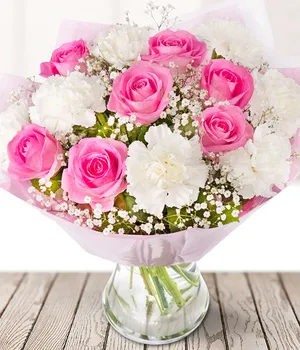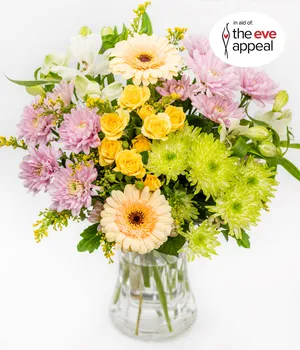‘Nip it in the bud’ in Partnership with The Eve Appeal
Eflorist found that 1 in 3 (32%) women don’t attend their cervical screening appointments.
Around 22,050 women and people with gynaecological organs are diagnosed with gynaecological cancer annually
This means that approximately 669 British women will sadly die of gynaecological cancer this month.
So, we took to one of the UK’s busiest train stations, London Waterloo, to raise awareness and money for the cause.
Gynaecological Cancer Awareness Month takes place in September, and to show our support, Eflorist is partnering up with the wonderful charity, The Eve Appeal.
The Eve Appeal is the UK’s leading national charity dedicated to funding research and raising awareness of the five gynaecological cancers - womb, ovarian, cervical, vulval, and vaginal. The world-leading research they fund is ambitious and challenging, but their vision is simple: a future where gynaecological cancers are a disease of the past.
Sadly, in the UK, 21 people will die every day because of gynaecological cancers - that’s approximately 669 per month. That's why on Monday 9th of September 2024, we headed to Waterloo station in London to hand out 669 flowers to raise awareness for the cause.
While statistics do very little to tell the true stories behind the real lives affected, we hope our event will help to remind people across the UK to raise awareness for gynaecological cancers.
Whether that’s going for an overdue cervical screening, giving money in aid of a dedicated cause, getting symptoms checked out, or passing on the message to a loved one: everyone can do their bit to help us raise awareness for these diseases.
Help us nip gynaecological cancers in the bud.
So what did we do?
The Eflorist team headed out to one of the UK’s busiest train stations, London Waterloo, to help raise awareness for gynaecological cancer. To do this, we handed out 669 white roses to people passing through the station, with an attached reminder to book and attend their cervical screening appointments and educate about the symptoms of gynaecological cancer.
We also interviewed women to test their knowledge on gynaecological cancer, and educate the public on the symptoms to be aware of. One woman told us: “As uncomfortable as it can sometimes be, I’ll never forget to attend my cervical screening appointment. Unfortunately, I have sadly lost a family friend from cervical cancer, so I know just how important these appointments are.”
But, women weren't the only people to receive the flowers. We also gifted the roses to men passing through the station to share with a woman in their life, with one gentleman telling us: “I’ll be giving this to my wife when I get home. I didn’t know that there were all these other types of cancers that the cervical screening doesn’t look at, these aren’t ever really talked about. I’ll make sure she looks at the symptoms and is aware of them all.”
We also created a short video detailing our research alongside highlight clips of our event at Waterloo.
Other ways you can help
Throughout the months of September to November, we’re going to be gifting £1 from the sale of every bouquet below directly to The Eve Appeal’s cause.
Why flowers? The History of Flowers as Feminine Symbols
It’s no secret that flowers and vulvas share some pretty strong visual similarities, and the similarities between the two have been documented in art, fiction, and even the language some of us use.
While the language associations between the two have largely been reduced in recent years, with campaigns for wider societal use of the anatomical names for reproductive organs, the visual symbolism between the two remains strong.
There are arguably many flowers that look like a vulva, and there are even flowers named after their similarities, including the Clitoria ternatea - an Asian fast-growing tropical climber with blue flowers.
And it’s not just flowers and vulvas that are used as representations of each other: flowers have historically been used as general symbols of femininity, with many people still associating the two to this day.
In Greek mythology, Aphrodite - the goddess of love, beauty, and desire - is often associated with flowers. One myth sees Aphrodite’s romantic partner Ares - the god of war - transform into a boar to kill her mortal lover, Adonis. Aphrodite is said to have pricked her foot on a white rose while running to save Ares, staining the flower with her blood and turning the rose red. It is said that this was the first red rose to appear on Earth, and the rose flower remains a symbol of romantic love to this day.
Similarly, in Hinduism, Lajja Gauri - the goddess of abundance, fertility, and sexuality - has a lotus flower instead of a head. The lotus flower is a powerful symbol of fertility in Hinduism, known as a magic womb for the universe and gods.
Taking all of this into account, that’s why we wanted to use the power of the flower to raise awareness, and encourage people to book in their next cervical screening appointment.
We know that reproductive organs and genders aren’t always binary, and if you’re a trans man or non-binary, you may still be at risk of some gynaecological cancers if you retained your reproductive organs during your transition.
Our friends at The Eve Appeal have dedicated advice for transgender and non-binary people here.
Gynaecological Cancer Symptoms
In the UK, there are three routine NHS cancer screenings, one of which is a cervical screening exam. Women are invited to attend these screenings once they reach the age of 25, but our research found that 1 in 3 (32%) women have missed a routine cervical cancer screening in the past. That’s over 7.1 MILLION*.
Our research found that 2 in 5 (40%) women are unable to correctly identify the symptoms of the 5 gynaecological cancers, with ovarian cancer being the type that women know the least about (56% incorrect).
Cervical screenings only help to prevent cervical cancer, so it’s important to always get your symptoms checked by a doctor, even if you’ve had a negative screening test - and even if you have cervical cancer symptoms.
They’re working hard to ensure that everyone knows what feels ‘normal’ for them so they can spot when something isn’t right, and want to open up conversations around the terminology used for women’s reproductive organs so that everyone knows the difference between a vulva and a vagina.
Check out their graphic below on the different types of gynaecological cancer symptoms, and the signs to look out for, or head over to their dedicated page for more information.
What do I need to know about my cervical screening?
While the actual process of getting routine cancer screenings, like a cervical screening, are generally quite straightforward, we know the emotions that come along with it can be anything but.
Feelings around cervical screenings can range from embarrassment to nervousness to fear and everything in between. And if you have any of these feelings before getting a routine screening, you’re not alone. In fact, almost two thirds (64%) of women told us they feel nervous before getting a screening.
Cervical screenings are one of the best ways to help prevent cervical cancer, and they’re offered to women in the UK between the ages of 25 and 64. How often you’re invited for one will depend on which country you live in in the UK, but generally, you’ll be invited back every 3 to 5 years to check that everything is alright.
It’s important to remember cervical screenings aren’t testing for cancer, they’re testing for HPV and cervical cell changes (which, if not treated, can develop into cancer), but this can still be nerve-wracking.
And while everyone’s anxiety may stem from different places and circumstances - some more complex than others - we’ve worked with The Eve Appeal to pull together answers to 5 questions that might help alleviate some of your cervical screening anxiety, and prepare you for when it comes to attending.
When do I need to attend my cervical screening?
From the age of 25, you should receive your first cervical screening invitation from the NHS. Once you’ve received this, contact your local GP to book your appointment.
You will then be sent a letter every three to five years to book a new appointment, until around the age of 50, as this depends on where you live in the UK. From this point, you should receive a letter every five years until the age of 64, however, if you have high-risk HPV, or any cervical cell changes are picked up, you will be checked more regularly.
Does a cervical screening hurt?
Your cervical screening shouldn’t be painful, but some people can find it uncomfortable. Some medical conditions, such as endometriosis, vaginismus, or vaginal dryness, can cause some pain however, so speak to your GP and share any concerns you may have with them.
Your GP can then help to offer solutions, such as using a smaller speculum during the examination.
Can you have a cervical screening on your period?
It’s recommended to attend your cervical screening appointment when you aren’t on your period, so if this is the case, contact your GP to rearrange your appointment.
What do I do if I’ve missed my cervical screening?
If you’ve missed your cervical screening, or your appointment is overdue, contact your GP or local sexual health clinic as soon as you can to arrange a new appointment.
Do I need to attend a cervical screening if I’ve had a HPV vaccine?
The current HPV vaccine protects against 9 strains of HPV - types 6, 11, 16, 18, 31, 33, 45, 52 and 58, and strands 16 and 18 cause around 70% of all cervical cancers.
There are 5 other strains of high-risk HPV (meaning they can cause precancerous cell changes) that are not currently in the vaccination. Over 99% of all cervical cancers are caused by HPV but there are a small number that are not.
Due to this, even if you’ve been vaccinated, it’s important that you still attend your cervical screening appointment to pick up any potential cell changes to your cervix.
It’s crucial that we all come together to spread awareness of gynaecological cancer - not just on Gynaecological Cancer Awareness Month, but every month. By doing your part, you can help to create a future where gynaecological cancers are a disease of the past. Nip it in the bud.
If you have any concerns on your gynaecological health, contact your local GP to book an appointment and discuss your symptoms, or contact ‘Ask Eve’ on their dedicated nurse-led information service about gynaecological health at 0808 802 0019.
‘Ask Eve’ is free to call from landlines or mobile phones, or you can get in turn via email at [email protected].
Methodology
* (7,165,098) Based on 2022 ONS figures that there are 22,390,933 women over the age of 25 (when routine NHS cancer screenings begin) living in the UK.
*Survey conducted by 3Gem and made up of 1,000 Brits aged 18+. Conducted between 23rd-27th August 2024






